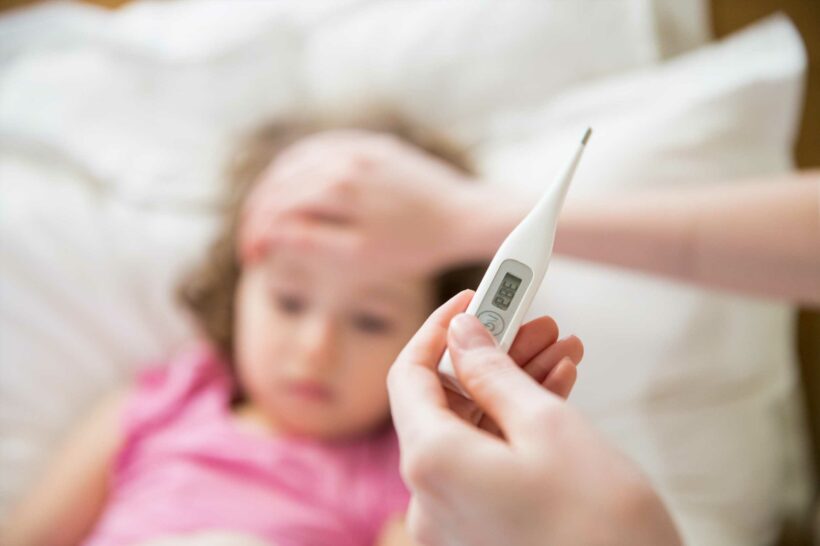AS parents, it can sometimes be difficult to know when to take your child to the doctor, or when you're overreacting.
And while there are situations in which a doctor's visit is probably unnecessary, there are five signs to look out for that warrant an immediate trip to the GP – or hospital if necessary.
Here, we run through those signs, and what to look out for.
A high temperature
While high temperatures can usually be controlled with paracetamol, and go within a couple of days, there are some situations in which you should take a child to the doctor for one.
A normal temperature for a baby or child is around 36.4C, high temperatures are classed as 38C or above, according to the NHS.
If you have a baby who's under three months old, a temperature of 38C warrants a trip to the GPs or a call to 111.
Read more Parenting stories
I’m a parenting expert – here’s why I never use the word ‘naughty’ on kids
Parenting expert warns the ‘naughty step’ is making your kids’ behaviour WORSE
If you have a three to six-month-old, you should do the same if they have a temperature of 39C or above.
You should also seek medical advice if your child has a high temperature and a rash, doesn't want to eat or their temperature doesn't come down with paracetamol.
Dehydration
You might think it's hard to tell if your child is dehydrated, but there are actually several easy things to look out for.
Check if they have tears when they cry – if they don't, they are probably dehydrated.
Most read in Fabulous
I’ve been a hairdresser for 17 years – the trendy shampoos I absolutely hate
I’m an arcade pro & there's a trick to always winning on the grabbing machines
I’m a 37-year-old mum and hate wearing a bra – I don’t care, judge away
Harry and Meghan's popularity in America crumbles after couple's oversharing
Likewise, check that they're doing as many wet nappies as usual.
Dehydrated children often have dry lips and a dry mouth, as well as sunken eyes.
And in babies, you can tell if they're dehydrated by looking at the fontanelle – the soft spot – on the top of their head.
If it's sunken, then they are.
Any signs of dehydration in your child, and you should make an appointment with your doctor as soon as possible.
A rash that doesn't disappear under pressure
Most parents will know the "glass test" – and it's a very important one to be aware of.
If your child has a rash, then roll a glass over the top.
If the rash disappears, it's likely to be something viral, and nothing to worry about.
But if it stays under the pressure of the glass, you need to seek medical advice immediately by calling 999.
Meningitis Now has more helpful information about what to do if your child has a rash you're worried about.
Breathing issues
There are various breathing issues that would warrant a trip to the doctor, or even the hospital.
These include shortness of breath, fast breathing, breathing difficulties and making a sound called a stridor when they breathe in.
The latter is a sign of croup, while others can indicate various health conditions, including asthma.
Whatever the reason for your child's breathing issues, you should definitely get them checked out sooner rather than later.
Drowsiness
On its own, drowsiness could be a sign that your child is pushing themself a bit too hard.
But if it's combined with any other symptoms – such as a fever, lack of appetite or signs of dehydration – then it should be further investigated as soon as possible.
If your child is asleep and you can't wake them up, you should seek medical attention immediately.
But if they are awake and just not as alert as normal, this is less of an emergency.
Saying that, it should still be looked into if it continues for more than a few days, or is combined with the symptoms listed above.
But above all, trust your instincts!
The main thing the NHS says is that parents should always "trust your instincts" when it comes to your child and their wellbeing.
You know as a parent when they're struggling and when they need to see a doctor.
Even if it takes multiple trips to your GP or A&E department, don't be embarrassed to push for more answers or treatment.
Read More on The Sun
My daughter chooses her bedtime – she’s labelled ‘spoilt’ but she’s behaved
EastEnders star returns to normal job a year after leaving the Square
"It can be difficult to tell when a baby or toddler is seriously ill, but the main thing is to trust your instincts," the NHS state on their website.
"You know better than anyone else what your child is usually like, so you'll know when something is seriously wrong."
Source: Read Full Article










